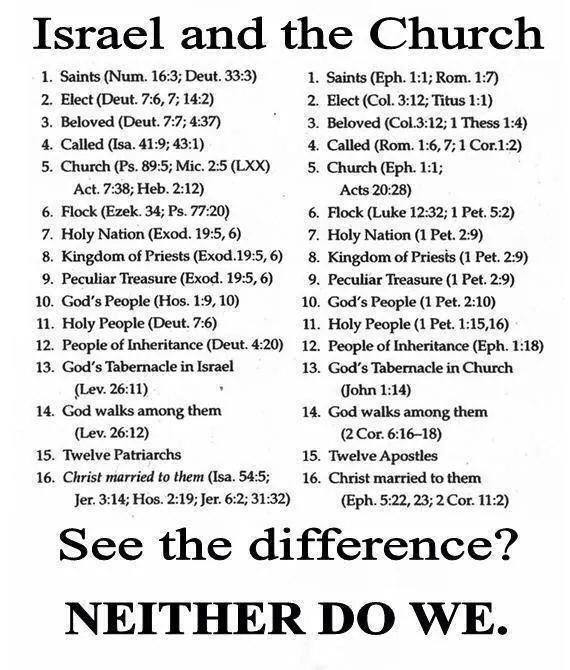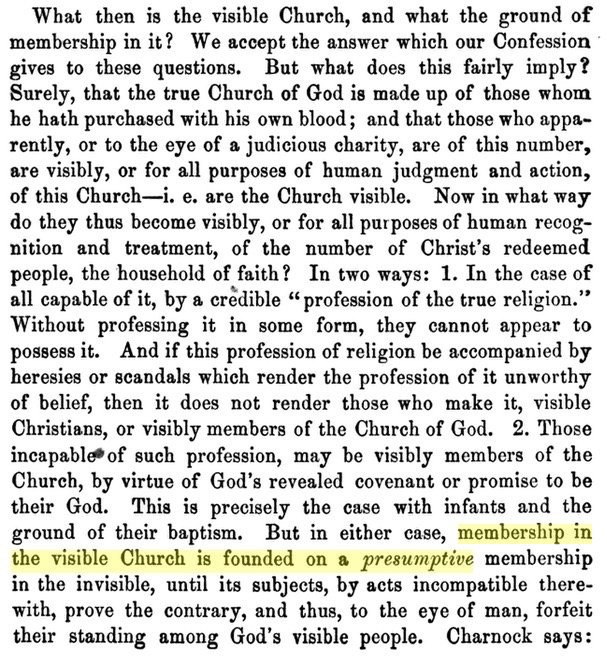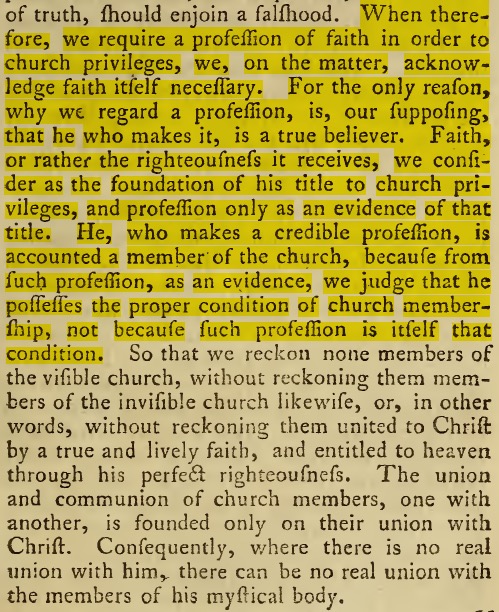Additional Resources
Dichotomous Nature of the Abrahamic Covenant, An Orthodox Catechism questions 72-73 Spanish & Portuguese Translation
On 13, Apr 2016 | In Resources | By Brandon Adams
Andrew Felts has translated questions 72-73 from An Orthodox Catechism into Spanish on his blog to give a brief overview of 1689 federalism, specifically the dichotomous nature of the Abrahamic covenant.
He has added a Portuguese translation as well:
Important Correction on Coxe
On 05, Apr 2016 | In Resources | By Brandon Adams
Samuel Renihan makes an important correction regarding the printed and Kindle versions of Covenant Theology: From Adam to Christ. At the beginning of chapter 4 in the RBAP publication, Coxe says
The covenant of grace made with Abraham was not the same for substance
But the original said
not but that the covenant of grace as made with Abraham was the same for substance
The implication is that
Coxe is saying that Genesis 12 contains the same covenant of grace for substance (there is only one) as found before and after this passage of Scripture, but it was made known to Abraham in a special way unlike any other example in the Bible.
This is helpful because many think Coxe argued that there were two Abrahamic Covenants, but that was not his meaning.
Please read Sam’s helpful post, as well as his analysis of the original and RBAP in a PDF.
A 1689 Federalism Response to Wellum’s “Progressive Covenantalism and the Doing of Ethics”
On 14, Mar 2016 | In Resources | By Brandon Adams
A 20 page paper by Stephen J. Wellum titled “Progressive Covenantalism and the Doing of Ethics” was posted in the New Covenant Theology Facebook group recently [Note: it has since been removed as it was not supposed to be posted publicly – it will be available in this volume]. It presents a good opportunity to bring to attention some of the important areas where 1689 Federalism (a particular version of covenant theology) disagrees with Westminster Federalism (what Wellum simply refers to as “covenant theology”), as well as highlight where 1689 Federalism believes Progressive Covenantalism errs. My comments will be brief, and I won’t be summarizing his argument, so make sure to read it first…
Israel and the Church: See the Difference?
On 09, Feb 2016 | In Resources | By Brandon Adams
This graphic has floated around social media:
Though perhaps written in response to dispensationalism, it is often posted in response to baptists in order to promote Westminster Federalism, which believes that Israel and the Church are one. However, a slightly closer inspection reveals that Israel and the Church, though very related, are not one. Rather, Israel according to the flesh is a type of Israel according to the Spirit. Read more…
Sermon Notes on the Covenant of Redemption
On 27, Jan 2016 | In Richard Barcellos | By Brandon Adams
Richard Barcellos offers some sermon notes on the Covenant of Redemption.
“DOLPHINS IN THE WOODS”: A Critique of Mark Jones and Ted Van Raalte’s Presentation of Particular Baptist Covenant Theology, Samuel Renihan
On 24, Jan 2016 | In Samuel Renihan | By Brandon Adams
In a JIRBS 2015 article, Samuel Renihan critiques a chapter in A Puritan Theology dealing with baptist covenant theology. Renihan demonstrates that Jones and Van Raalte’s failed to adequately understand and present the baptist position.
No one ever loses a debate. Both sides walk away in victory because they stated their cases correctly. The opponent, of course, completely misunderstood and simply didn’t get it. Even the audience agrees. “Our side won.” Sadly, most debates are like this, and debates between paedobaptists and Baptists throughout the years have been no exception to the trend. For many centuries the baptismal debate has divided, disappointingly but necessarily, brothers who otherwise share a great deal in common.
In Joel Beeke and Mark Jones’ massive and delightful A Puritan Theology they have dedicated a chapter to describing this debate as it took place in the late seventeenth century. Their chapter sets out to do two main things: first, to vindicate John Owen’s covenant theology from Baptist appropriation, and second, to demonstrate how John Flavel bested Philip Cary in their printed debate on the subject of covenant theology. This present article will evaluate the portrayal of the Particular Baptists as it is found in that chapter, clarifying how and why the Particular Baptists appropriated John Owen’s covenant theology and demonstrating that while the Cary/Flavel debate is useful for illustration, Cary’s views must be placed within the context of Particular Baptist federalism as a whole—particularly regarding the conditionality of the covenant of grace and the purpose and design of the Mosaic covenant. This evaluation is not intended to revive the debate itself, but rather to present a fairer and more complete portrait of Particular Baptist federalism and their arguments against paedobaptism.
Keach’s Articles of Faith
On 09, Nov 2015 | In Resources | By Brandon Adams
H/T Kenneth Clayton
In 1697, Benjamin Keach published “The articles of the faith of the Church of Christ, or, Congregation meeting at Horsley-down” because “the General and more Large Confession of the Faith of our Churches, is now out of Print; but that is not all, for that being 12 d. price, some cannot well purchase it.” and because certain beliefs held by his congregation (“that of Imposition of Hands upon baptized Believers as such, and singing of God’s Praise, &c.”) were not included in the 2nd London Baptist Confession.
Here are the sections related to covenant theology:
Of Original Sin.
*VII. WE do believe, that God having created Man, he entered into a Covenant of Life with him, upon the condition of perfect Obedience; making the first Adam a common Head to all his Seed: and that our first Parents being left to the freedom of their own Will, fell from the Estate wherein they were created, by eating of the forbidden Fruit: and that Adam being set up as a pub∣lick Person, we all sinned in him, and fell with him into a state of Sin, of Wrath and Misery; the Sinfulness of which state consists in the guilt of Adam‘s first Sin, the want of Original Righteousness, and the Corruption of our whole Nature: from whence all actual Sins proceed, as Water out of a filthy and an unclean Fountain. So that not only by Imputation all Men became Sinners in the first Adam, but also as the same cor∣rupt Nature is conveyed to all his Posterity,* who descend from him in ordinary Generation.
By this Sin all Mankind lost the Image of God,* and Communion with him, being liable to all the Miseries of this Life, and to Death itself; and also are dead in Sins and Trespasses, and obnoxious to the Wrath of God, and the eternal Pains of Hell for ever. Hence we say that all are conceiv’d and born in Sin,*and are the Children of Wrath, even the Elect as well as others, being wholly defiled in all the Faculties and Parts of Soul and Body,* and utterly indisposed and disabled to do any thing that is spiritually good, and wholly in∣clined with a strong propensity to all things that are evil.
Of Christ the Mediator.
IX. WE believe that God ha∣ving, out of his own meer good Pleasure,* and infinite Love, elected some Persons of the lost Seed of the first Adam unto everlasting Life, from all Eternity, did enter into a Cove∣nant of Grace with the second Per∣son of the Trinity, (who was set up as the common Head of all the Elect) to deliver them out of the state of Sin and Misery,* and to bring them into a state of Salva∣tion and eternal Happiness.
That the second Person in the Godhead,* (being the eternal Son of God, Coessential, and Coequal with the Father) according to that holy Covenant and Compact that was between them both, became Man, or assumed our Nature,* and so was, and continueth to be God and Man in two distinct Natures, in one Person for ever. And that he the Son of God by his becoming Man,* did take unto him a True Body, and Reasonable Soul, being conceived by the holy Spirit in the Womb of the Virgin, and was born of her, yet without Sin.
Of the Law.
XVII. WE believe God re∣quires Obedience of Man, and that the Rule of that Obedience is the moral Law as it is in the Hands of Christ;* which teacheth all Persons their Duty to God, and to Man; the Sum of all being this, to love the Lord our God with all our Hearts, with all our Souls, and with all our Strength, and our Neighbours as our selves. And that tho the Law is abolished as a Covenant of Works, and as so considered, we are dead to it,* and that dead to us; yet it remains as a Rule of Life and Righteousness for ever.
*XVIII. We believe no mere Man, since the Fall, is able in this Life perfectly to keep the Holy Law of God; and that every Of∣fence against the Law deserves eternal Death, tho some Sins are more heinous in God’s Sight than others.
And that God, as a simple Act of Mercy, will not, doth not, pardon any Man; neither doth it seem consistent with his Holiness and Justice so to do,* without a full Satisfaction:* wherefore he sub∣stituted Christ in our room and stead, perfectly to keep the whole Law, and to die,* or bear that Wrath which we deserved for our breaking of it;* he being pleased in his infinite Love and Grace to transfer our Sins, Guilt and Pu∣nishment, upon his own Son, (who took our Nature upon him, as our blessed Head and Representative) that his active Obedience and Righteousness might be our just Title unto eternal Life; and his Death (who bore our Hell-Tor∣ments) be our full Discharge from the Wrath of God,* and eternal Condemnation.
And that all who would receive this Title,* and have this Discharge so as to escape God’s Wrath, and the Curse of the Law,* must fly to Christ, and lay hold on him by Faith; which Faith is known by its Fruits, having lively, Sin-kil∣ling, Soul-humbling,* Self-abasing, Christ-exalting, and Heart-purify∣ing Operations, always attending it.
Of the First Covenant.
XXX. WE believe that the first Covenant,* or Cove∣nant of Works, was primarily made with Adam, and with all Mankind in him,* by virtue of which he stood in a justified state before the Fall,* upon the condition of his own perfect and personal Obedience. But by the Fall he made himself uncapable of Life by that Covenant.
That the Law God gave by Mo∣ses to Israel, was of the same nature of that given to Adam,* being a se∣cond Ministration of it; but not given for Life, but to make Sin ex∣ceeding sinful, and to shew how unable Man was in his fallen state to fulfil the Righteousness of God;* and so (with the Ceremonial Law) it was given in subservienty to the Gospel,* as a Schoolmaster to bring Sinners to Christ.
Of the New and Second Covenant.
XXXI. WE believe the Covenant of Grace was primarily made with the second Adam,* and in him with all the Elect, who as God-man, or Me∣diator, was set up from everlasting as a Common Person,* or as their Head and Representative; who freely obliged or ingaged himself to the Father for them, perfectly to keep the whole Law in their Nature that had sinned,* and to satisfy Divine Justice by bearing their Sins upon his own Body, i. e. the Guilt of all their Sins,* which were laid upon him: and that he sustain’d that Wrath and Curse in his Body and Soul,* that was due to them for all their Transgressi∣ons:* and having received their dis∣charge from Wrath and Condem∣nation, he gives it out to all that believe in him,* and obtain Union with him, who are thereby brought actually into the said New Covenant, and have a personal Right to all the Blessings thereof.
2015 Founders Conference w/ Commentary
On 30, Sep 2015 | In Audio, Jeffery Johnson, Pascal Denault, Resources | By Brandon Adams
2015 SOUTHERN BAPTIST FOUNDERS CONFERENCE—SOUTHWEST
HOSTED BY: HERITAGE BAPTIST CHURCH, Mansfield, Texas
The Distinctives of Baptist Covenant Theology
SEPTEMBER 24-25, 2015
2015 Founders Conference on SermonAudio.com
|
|
|
|
|
|
|
|
|
This conference was a great encouragement to 1689Federalism.com. 2 years ago very few people were aware of this view and now people are gathering together at a conference to learn more about it. Lord willing, this trend will continue.
Due to some of the material presented in the lectures, some comments will be offered. Read more…
Abraham Booth’s Essay on the Kingdom of Christ now in Portuguese
On 21, Sep 2015 | In Resources | By Brandon Adams
Abraham Booth’s An Essay on the Kingdom of Christ is now available in Portuguese!






